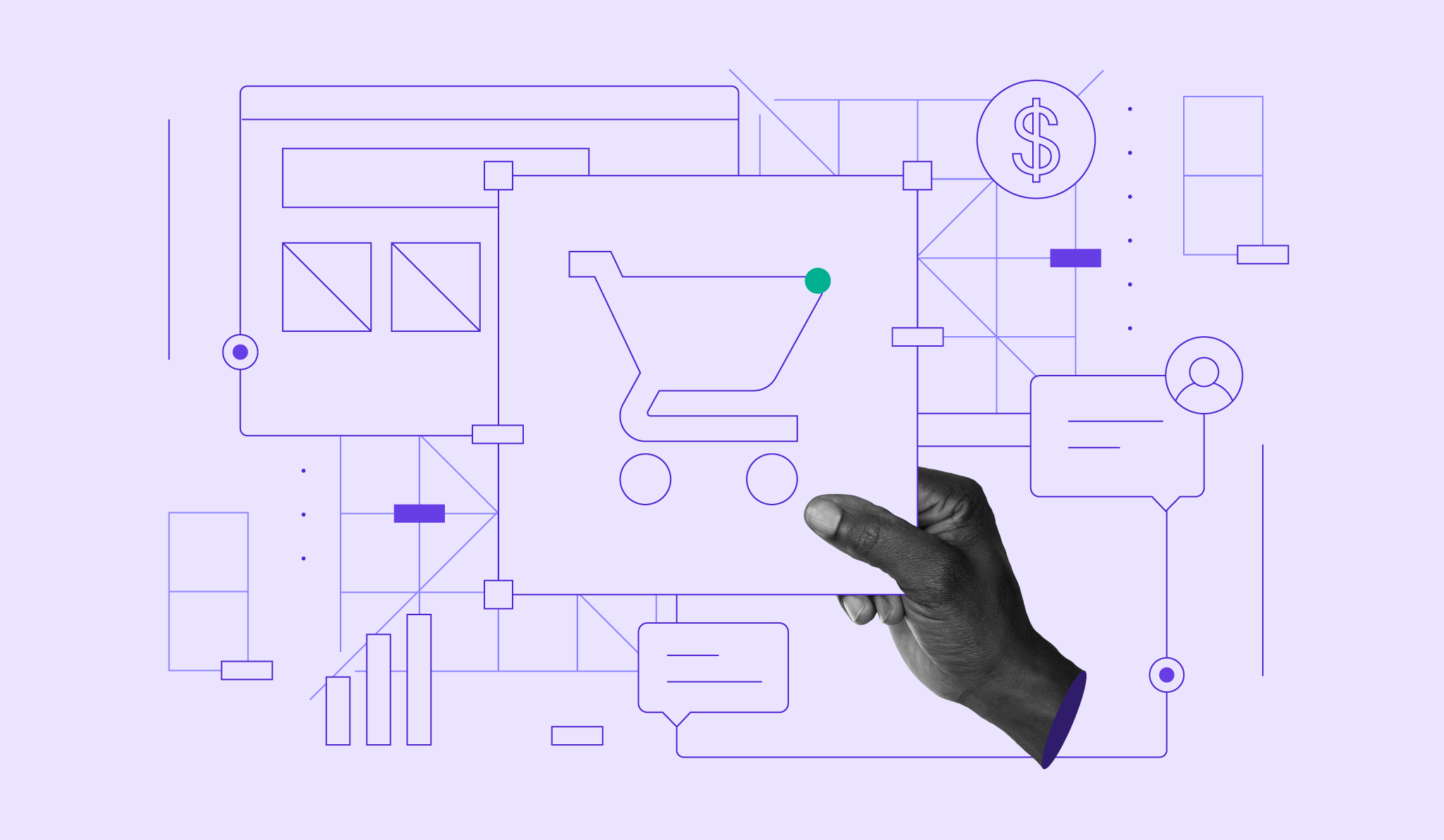How to start a baking business: A step-by-step guide

Whether you’re starting small with custom orders from home or planning to open your own store, this guide will help you transform your baking dreams into a successful business.
Like your favorite recipe, creating a thriving bakery requires the right ingredients in the right amounts – from choosing your business model and perfecting your offers to building your online presence and promoting your business.
Ready to turn your passion for baking into a thriving business? Let’s get started.

How to start a baking business
Starting a successful baking business requires careful planning and preparation. By following these eight essential steps, you’ll be well on your way.
1. Define your business goals
Before you start building your bakery, the first thing you need to do is decide what kind of business you want to start.
Do you want to have a physical bakery? Do you prefer to sell baked goods from home? Or are you happy to sell at local markets?
A good way to decide what you want to do is to identify short-term and long-term goals. Having clear goals will help you make better decisions about everything else, from pricing to marketing and the equipment to buy.
Set short-term goals
Think of your first year as laying the groundwork for your bakery’s future. This is when you’ll establish yourself and test what works.
Start by asking yourself some key questions:
- Do you want this to be a side hustle or your main income?
- How many orders can you realistically handle per week?
- What minimum monthly income do you need to make this worth your time?
- Which specific products will you start with?
Set long-term goals
This is where you dream bigger and plan for growth. Your long-term goals should inspire you while remaining achievable.
Here are some questions to think about:
- Do you see yourself running a busy bakery business?
- Will you focus on wedding and special event cakes?
- Do you want to hire employees in the future?
- What annual revenue would make you feel successful?
Choose your starting point
Setting clear goals will help you decide whether starting from your home kitchen or renting a storefront is right for you. Both paths can lead to success, but the right one depends on your unique situation.
A home-based baking business might be perfect if you’re juggling other commitments or want to minimize initial costs. You’ll have the flexibility to take client orders around your schedule while saving money on rent and equipment.
Many successful bakers start by selling to friends and family before expanding to local markets and online orders.
On the other hand, a physical storefront could be ideal if you’re ready to go all-in on your baking dreams. While it requires more upfront investment, a commercial bakery offers the potential for walk-in customers and features like a coffee shop or baking classes.
The key is to choose a starting point that matches your current resources while leaving room for future growth.
2. Assess your baking skills
Now that you’ve set some goals, it’s important to evaluate your current skills and readiness. This self-assessment will help you identify your strengths and areas where you may need to improve in order to achieve those goals.
It’s okay if you need to improve in some areas. The key is to identify those areas and take steps to strengthen your skills and mindset before moving forward.
Would courses in wedding cake design or gluten-free baking interest you? Are there specialty skills, like sugar work or chocolate tempering, that you really want to learn?
Look into local baking classes, online courses, or even professional certification programs that can take your baking from good to unforgettable.
3. Create a plan
The next step is to create a bakery business plan that outlines how you’ll achieve those goals.
It doesn’t have to be comprehensive, but it needs to be detailed enough to give you a roadmap for what to do in your business.
Here’s what you should include in your business plan:
Define your target market
Be specific about who you want to sell to. For example, are you targeting:
- Busy parents, who need custom birthday cakes?
- Health-conscious professionals craving gluten-free treats?
- Young couples planning intimate wedding celebrations?
Understanding your ideal customer shapes everything from your menu to your marketing.
Create a menu and pricing strategy
Creating a profitable bakery menu can be a simple process.
- Start with core items that showcase your favorite recipes.
- Then, set prices that account for your target profit margins, cost of ingredients, time, and other expenses, while remaining competitive in your market.
- Boost your revenue with special bundles, such as a “Weekend Brunch Box” or “Cupcake of the Month” subscription service.
The most appropriate menu is the one that perfectly matches what you do best with what your customers crave.
Choose your service model
An important decision you need to make is how your customers will receive the baked goods.
- Designate specific pickup times and schedule delivery time slots. For example, 10am to 2pm or 4pm to 7 pm.
- Invest in sturdy boxes with proper ventilation and use secure packaging for delivery to prevent damage.
- For deliveries, decide whether you will partner with delivery apps, such as DoorDash or UberEats, or deliver the items yourself.
- Calculate delivery fuel and time costs and set a minimum order price that makes it worth your time.
Think about which of these options would fit best for your goals and current situation.
Estimate startup costs and financial projections
Create a detailed list of essential investments required to start your business.
- Your startup costs will include equipment, supplies, and an initial marketing budget.
- Keep a cushion for equipment repairs, ingredient price spikes, and seasonal slowdowns.
- Develop financial projections that account for your desired income, profit margins, and long-term growth plans.
Your startup costs should reflect the short-term goals you’ve already set while keeping your long-term vision in sight.
Identify potential funding sources
Once you know how much capital you need to start your baking business, it’s time to see how you can fund it.
- Starting with personal savings keeps you debt-free and in full control, though ensure you maintain a separate emergency fund for personal needs.
- Loans from family or banks can help you grow faster, but they come with either relationship risks or monthly payments that could strain your early profits.
- The key is matching your funding to both your risk tolerance and business goals. For example, a home bakery can often thrive on bootstrapped savings, while a retail storefront might justify the calculated risk of a business loan.
Start with what you can afford within reason, and gradually expand as your customer base grows.
4. Set up your business legally
A big part of starting a successful bakery business is following all legal requirements. Although complying with local regulations might seem complicated, they help build trust with customers and protect your growing brand.
Here’s what you need to do:
Register your business
Your first step is choosing the perfect business structure that aligns with your goals. Here are two of the main options:
- Sole proprietorship. Perfect for solo bakers starting small, offering simplicity and direct control.
- LLC. Provides personal asset protection while maintaining flexibility. Ideal if you have plans to grow beyond a home baking business.
In most locations, you can register a business online, which makes the process simple.
Obtain necessary licenses and permits
Once you’ve registered your business, you need to familiarize yourself with your state or country’s guidelines for food safety and sanitation.
It’s common for home-based bakery businesses to have different legal requirements compared to those operating in commercial kitchens.
Some states have cottage food laws that allow certain types of low-risk food products, like baked goods, to be prepared in home kitchens with fewer regulations.
Connect with your local health department, ask around at business development centers, and speak with experienced food entrepreneurs to check your local food safety regulations.
5. Source ingredients and equipment
Now that you’ve established your legal foundation let’s examine the heart of your baking business – the ingredients and equipment.
Source premium ingredients
Think of ingredients as the stars of your bakery business. Using premium ingredients creates exceptional products that turn first-time customers into loyal fans.
In contrast, cutting corners with cheap ingredients can lead to lackluster results that fail to impress customers.
Here are some important points to keep in mind when using staple ingredients.
- Flour. Choose an unbleached, professional-grade floor that matches your needs. Look for high-protein bread flour for artisan bread. Fine pastry flour is your best bet for delicate pastries.
- Sugar. Pure cane sugar offers consistent results and superior flavor. Consider stocking both standard granulated and specialty sugars like muscovado or demerara to add unique character to your creations.
- Butter. Opt for high-fat, unsalted butter from respected dairy producers. The higher price point pays off in richer flavor and better texture in your final products.
- Eggs. Build relationships with local farms for the freshest eggs possible. You will get superior quality, and you’ll also have a great story to share with customers about supporting local farms.
Do the same with other ingredients. For example, if you want to be known for your chocolate chip cookies, use premium, high-cocoa butter chocolate chips or chunks for a richer flavor.
Testing out different options is always a good idea. Store samples from different suppliers and test them in small batches to find your perfect match.
Choose professional equipment
The right equipment will help you transform those carefully chosen ingredients into exceptional baked goods that delight your customers.
Start with versatile tools that can handle multiple tasks, then expand your collection as specific needs arise. Remember, it’s better to have fewer high-quality tools than many unreliable ones.
Here is essential bakery equipment to consider:
- Mixers. Start with a professional-grade stand mixer that matches your current volume but also offers versatile attachments and power settings. A 5-quart KitchenAid might be perfect for home-based beginners, while a 20-quart Hobart could be ideal for larger operations.
- Oven. Convection ovens are great for even baking and consistent results. Consider starting with a quality countertop model if you’re home-based, with plans to upgrade to a full commercial unit as you grow.
- Food processors. Start with a 12-14 cup commercial-grade model for versatility. Brands like Cuisinart or Robot Coupe offer models that can handle everything from grinding nuts to creating perfect pie crusts. For larger operations, consider models with continuous feed options.
- Storage solutions. Invest in professional-grade, airtight containers that stack efficiently. Choose clear, square containers with measurement markings to maximize space and track stock levels easily. Use larger ones for staples like flour and sugar and smaller ones for specialty ingredients.
Take time to evaluate what equipment best fits your current needs and future goals. Start with these essential tools, and consider other basics like cooling racks, baking sheets, molds, and measuring tools.
Build supplier relationships
Building strong relationships with reliable suppliers helps you receive good prices, and also ensures consistent access to premium ingredients.
Here’s how to create partnerships that will help your bakery thrive:
- Research suppliers. Start by exploring local restaurant supply stores, attending food industry trade shows, and checking online wholesale marketplaces. Remember to read reviews and ask for references before committing to anything.
- Test suppliers first. Always request samples before placing large orders. Test ingredients in small batches of your signature recipes to ensure they perform consistently. Keep detailed notes about quality, delivery times, and customer service.
- Choose multiple suppliers. Choose wholesale clubs for basics and specific suppliers for unique ingredients. This gives you both the best prices and access to premium items that make your products special.
- Have a backup plan. Always have a backup plan for specialty ingredients. Nothing derails a busy baking day like running out of a key component.
When you build strong relationships with reliable suppliers, you can spend less time worrying about inventory and more time creating exceptional baked goods that delight your customers.
6. Build an online presence
Your online presence is often the first place potential customers learn about your treats and services. The best way to start working on one is to build a bakery a website.
Hostinger Website Builder makes this easy. You can describe your bakery to our AI, and it will create a personalized layout that looks great on both computers and phones. With a drag-and-drop editor, you can then move elements exactly where you want them, with no coding required.

Essential website pages and features
Your bakery website needs several key pages and features to serve your customers well:
- Homepage. Start by creating a homepage that shows off your most appealing treats and clearly states your location and hours.
- Product pages. Create detailed pages with high-quality photos, descriptions, and prices for your baked goods.
- About us. Include a page where you share your bakery’s story and what makes your recipes special.
- Galleries. Consider adding a gallery page to showcase your baked goods and favorite creations.
- Online ordering. Add an online ordering system so customers can place orders for pickup or delivery.
Hostinger Website Builder makes all of this as simple as following your favorite recipe. It also integrates with popular payment systems, making it easy to accept online payments securely.
Set up your Google Business Profile
In addition to creating a website, it’s important to also set up a Google Business Profile for people to discover you on search engines.
When properly set up, your Google Business Profile will appear in Google Maps and local search results with photos, reviews, and key information.
Keep your profile updated with current hours, photos of your latest creations, and prompt responses to customer reviews.
This helps build trust and makes it easy for customers to find directions, place calls, or visit your website directly from Google.
Help customers discover your bakery
When someone searches for “bakery near me” or “custom cakes” in your area, you want them to discover your online listings.
Check out Jappacakes in Lanark, Scotland. When someone searches “wedding cakes in Lanark,” they appear prominently in search results through their website, Google Business Profile, and Facebook page.

This is exactly the kind of search results you want to achieve for your bakery.
7. Market your baking business
Now that your online presence is starting to take shape, let’s explore how to promote your bakery through social media and local marketing strategies.
Social media
Each social channel offers unique opportunities to share your story and connect with food lovers.
Instagram is perfect for showcasing stunning photos and videos of your latest creations. Use Instagram Stories to share daily specials and behind-the-scenes glimpses of your baking process.
Use location-specific hashtags to help local customers discover your bakery, like #[yourcity]bakery and #freshbaked[yourcity].
TikTok allows your personality to shine. Create engaging content showing how you frost that perfect cake or laminate croissant dough. Viewers love seeing the transformation from raw ingredients to finished masterpiece.
Run interactive promotions like “Tag a Friend Who Needs a Cookie” contests with delicious prizes.
Facebook helps you build a community around your bakery. Share your story, engage with local businesses, and respond promptly to comments.
Post your weekly special calendar and upcoming events to keep followers informed and excited.
Jappacakes does this well on their Facebook page. When they hosted their Wedding Cake Open Day, they created excitement leading up to the event by posting about it with photos of their stunning wedding cakes.

Local influencer partnerships
Partnering with local food influencers can put your bakery in front of an engaged audience that’s hungry for local recommendations.
Here’s how you can build authentic relationships with food influencers:
- Research potential partners. Explore local food blogs and social media accounts with engaged followers.
- Create together. Co-create signature items that reflect the influencer’s personality.
- Share your bakery. Host private “Behind the Counter” experiences where influencers learn to make their favorite treats.
- Offer exclusive value. Design limited-time bundles exclusively for their audience, like “The Foodie’s Signature Box”.
- Create excitement. Host “Influencer First Taste” events for new seasonal menu launches.
- Measure success. Track the performance of each partnership through unique discount codes, dedicated landing pages, or special item sales.
Focus on building genuine relationships with influencers who truly love your products and align with your brand values.
Local marketing strategies
Getting your bakery noticed in your local community is also a great way to gain attention while keeping costs low.
Here are some effective local marketing strategies to try:
- Flyers. Design eye-catching flyers featuring specials and place them in areas such as community centers, libraries, and grocery stores.
- Partnerships. Work with local coffee shops to create perfect pastry-coffee pairings.
- Associations. Join and actively participate in your local business association or chamber of commerce.
- Sponsorships. Support youth sports with creative sponsorships like “Player of the Game” cookie packages.
- Catering. Design catering packages for local companies to enjoy during their meetings.
- Markets. Sign up for local farmer’s markets, craft fairs, and food festivals to offer exclusive tasting boxes.
Experiment with different approaches, track what works, and adjust your strategy accordingly.
8. Analyze and grow your business
Now that you’ve laid the essential groundwork to start a bakery business let’s explore key strategies that will help you grow.
Track your finances
Let’s explore how to set up effective systems for tracking your bakery’s financial performance.
- Get organized. Set up basic accounting software like QuickBooks or Wave to track all cash flow.
- Know your costs. Calculate costs per item, record delivery-related expenses, and note seasonal variations.
- Watch your sales. Record daily sales by product, track special event performances, and monitor peak hours and slow periods.
- Be consistent. Create regular bookkeeping routines, like weekly sales reviews and monthly profit analysis.
Understanding your numbers will help you make informed business decisions and identify opportunities for growth.
Grow through customer feedback
Customer insights help you refine your services and create products people truly want.
- Listen actively. Create simple feedback questionnaires with Google Forms, check reviews on Google and Yelp, and monitor social media comments.
- Stay informed. Track feedback around product satisfaction, pricing, new product suggestions, and interest in special events.
- Engage often. Review feedback regularly, respond to all comments within 24 hours, and document common suggestions.
- Take action. Create an action plan for improvements, such as adjusting recipes or modifying services.
Once you make changes, be sure to continue tracking performance, and don’t be afraid to adjust further if necessary.
Conclusion
You now have the essential ingredients for starting your baking business. Let’s review the steps to keep you moving forward.
- Start by defining your short-term and long-term goals.
- Assess your baking skills and see if you would like extra training.
- Create a business plan that will help you achieve your goals.
- Register your business and obtain the necessary licenses and permits.
- Source premium ingredients and the right equipment from trustworthy suppliers.
- Build an online presence using Hostinger Website Builder.
- Promote your business through social media and local marketing strategies.
- Track your sales performance and grow through customer feedback.
Remember, some of the most beloved bakeries in your community likely started just where you are now.
With dedication, careful planning, and the steps outlined in this guide, you might become your community’s new favorite baker.
How to start a baking business FAQ
Is baking a good side hustle?
Baking makes an excellent side hustle because you can start small with minimal investment and scale gradually. The flexibility allows you to test recipes and build a customer base while keeping your day job, and the profit margins can be significant once you establish yourself.
What mistakes do startup bakeries make?
The biggest mistakes new bakeries make are underpricing their products (not accounting for time, ingredients, and overhead) and trying to offer too many different items instead of specializing. Another common error is not properly calculating startup costs and running out of operating capital before building a steady customer base.
Can I start a bakery with no money?
While you’ll need some initial investment, you can start very small by taking pre-orders and using your existing kitchen equipment. Begin with a signature item that requires minimal ingredients, take deposits upfront to fund purchases, and use free social media marketing to build your brand.
How do I start baking at home to sell?
Start by researching your local cottage food laws to understand what you can legally sell from your home kitchen. Then, create a focused menu of your best items, set up proper food safety protocols, and begin marketing through social media and word-of-mouth to build your first customers.
What insurance do I need for a baking business?
You will likely need general liability insurance to protect against customer claims and product liability insurance specifically for your baked goods. Consider adding business property insurance if you have expensive equipment or a dedicated commercial space.




